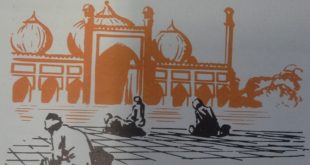Thirteen and a half centuries ago a new religion began in Arabia. Today millions of people are followers of this religion. It is called Islam and its followers, Moslems. All their lives long, Moslems must pray, in ways clearly prescribed, five times every day. No ordinary event must be allowed to interfere with these moments of prayer. Moslems must learn to recite their creed — a long statement of their religious belief. For one month each year they must fast all of every day from sunrise to sunset. They must give generously to charity. They should, if at all possible, …
Read More »India and the Indies 1856 – 1914
In 1856, Great Britain was at war with Russia in the Black Sea area and with the Chinese emperor in south China. Many British troops had been withdrawn from India to fight on these battlefronts. As a result, nine-tenths of the 200,000-man army guarding Great Britain’s largest and richest possession, the subcontinent of India in south-central Asia, consisted of native soldiers called sepoys. At the time, the British were putting a new type of rifle into service in the Indian Army. To load it, a rifleman had to insert each cartridge separately and the cartridges were covered with grease. In …
Read More »Islam the Civilizer A. D. 622-1406
IF Islam had never existed, the Christian countries of the world would probably be less advanced and certainly less varied, than they are. For it was Moslems who gave the West many of its basic skills and ideas. From the eighth to the thirteenth centuries, the Arabs and the other Islamic peoples were the main carriers of western civilization. While Europe was torn by almost constant fighting, Moslem scholars preserved the learning of the ancient world. Other Moslems added discoveries and original works of their own. In time, translators in the parts of Europe that were in closest contact with …
Read More »Seljuks and Mamelukes A.D. 950-1517
LIKE THEIR relatives the Mongols, the Turks began as wandering herdsmen in Central Asia. Their first contact with Islam was as victims rather than victors. When Arab armies overran the southern part of their homeland in the eighth century, many Turks were captured and enslaved. Recognizing their talent for fighting, their new masters enrolled them in their armies. In time, many of them reached high positions in the lands of their adopted religion. About the middle of the tenth century, tribesmen from Turkistan, led by a chief named Seljuk, settled near the city of Bokhara. There they became converted to …
Read More »Rival Caliphs and Amirs in the West A.D. 750-1492
IN 750, when the first Abbasid caliph ordered a wholesale massacre of the family that had ruled before him, hardly any of the Omayyads came out alive. One who did was a twenty-year-old youth named Abd-al-Rahman, a grandson of the tenth Omayyad caliph. Fleeing from a Bedouin camp on the Euphrates, he wandered in disguise through Palestine, Egypt and North Africa. Again and again he barely escaped being discovered and seized by Abbasid spies. His desperate flight lasted, altogether, five years. Finally he came to the town of Ceuta, on the northwest coast of Africa, where some Berber chieftains, who …
Read More »The Holy Book of Allah A. D. 632-732
Mohammed sometimes dictated his thoughts to his secretary, Zayd, but when he spoke in public no one wrote down what he said. Instead, his listeners learned his speeches by heart and mistakes crept in, as they usually do. Only a short time after Mohammed’s death people were repeating his sayings in quite different ways. If Mohammed had been anyone else, this would not really have mattered. It would have been enough to remember what he had said without bothering too much about how he had said it. But the Moslems believed that God himself had addressed them through Mohammed. Every …
Read More »Mohammed, Prophet of Allah A. D. 571 – 632
IN THE year 571, in Mecca, a boy was born in a humble household of the Quraysh. No one knows what name he was given. His father died before his birth and his mother when he was six. The orphan, boy now called Mohammed, was brought up by his grandfather. When his grandfather also died, he came into the care of his uncle, Abu Talib. Nothing definite is known about his early life. As a boy, he may have tended sheep at the edge of the desert outside the city. When he was old enough to ride a camel, he …
Read More »Arabia, Mother of Religions 3000 B. C. – 570 A. D
ARABIA, the big, boot-shaped peninsula off the northeast corner of Africa, is one of the hottest and driest regions on earth. It is also extremely rugged. Almost all of it is made up of mountains‚ deserts and immense plains of sand broken by hills. Not a single river crosses it, only dry riverbeds called wadis which quickly carry away the little rain that falls. Water is so scarce that trees and plants can grow only along some of the coasts and in small “islands” of green called oases, mostly found in the wadis, which dot the vast interior. Yet this …
Read More »






